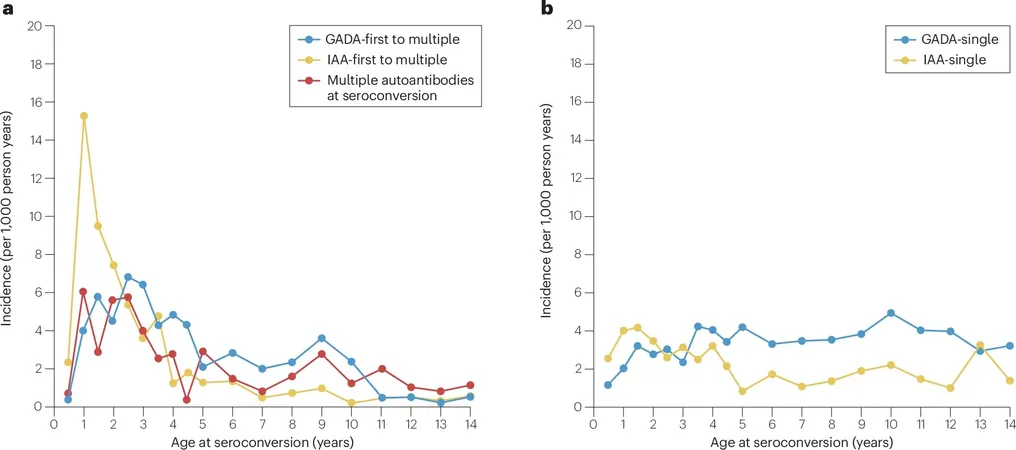
New Breakthroughs in Type 1 Diabetes Research as TEDDY Study Approaches Finale
2024-11-04
Author: Yu
Introduction
The TEDDY study, a groundbreaking international research initiative aimed at understanding the causes of type 1 diabetes, is set to conclude in 2025. Children involved in the study will submit their final samples from research clinics located in Sweden, Finland, Germany, and the United States. As one of the largest studies of its kind, TEDDY has significantly advanced our understanding of how type 1 diabetes develops, with ongoing analysis focused on prevention strategies.
Impact of Type 1 Diabetes
Type 1 diabetes is a serious autoimmune condition affecting over 1.2 million children and adolescents aged 20 and under. Alarmingly, both Sweden and Finland hold the highest incidence rates of this disease globally. As cases rise globally, understanding the underlying causes becomes increasingly critical, as individuals with type 1 diabetes require insulin treatment for survival.
Objectives and Findings of TEDDY Study
Initiated in 2004 with nearly 8,700 participants, the TEDDY study's main objective is to identify the triggers — both genetic and environmental — that lead to the development of type 1 diabetes in children. The findings from TEDDY have already led to numerous peer-reviewed publications in prestigious journals and have provided compelling evidence supporting the interplay of genetic predisposition and environmental factors in the onset of the disease.
In a recent article published in *Nature Reviews Endocrinology*, the most significant findings from the study have been summarized as researchers await the final data collection in March 2025. Significant contributors to this article include Åke Lernmark, principal investigator in Sweden, and Jeffrey Krischer, director of the TEDDY Data Coordinating Center.
Lernmark emphasized the remarkable commitment shown by the children and their families throughout this long-term study. Many parents were motivated by a desire to contribute to the understanding of this critical health issue. "The dedication of these families has been vital to our progress," said Krischer, a professor at the University of South Florida.
The Role of Autoantibodies and Screening Initiatives
One of the key focuses of the TEDDY study has been tracking the development of diabetes-related autoantibodies in children. The detection of these autoantibodies can indicate that the body’s immune system is attacking the insulin-producing cells in the pancreas. The study revealed that autoantibodies against insulin are most frequently observed in children during their first three years of life. This has led researchers to estimate the individual’s risk for developing type 1 diabetes, providing a valuable tool for early screening.
While it was initially believed that diabetes would manifest shortly after the first autoantibody appeared, findings show it may take several years for the disease to fully develop. This realization has spurred interest in screening for type 1 diabetes within healthcare systems, with genetic risk scores being utilized to identify children who may benefit most from early detection.
Continuous Research and Future Directions
Moreover, the TEDDY study has opened doors to various other research endeavors. Investigations have identified a concerning relationship between enterovirus infections and the emergence of diabetes-related autoantibodies. Meanwhile, research shows that administering probiotics to infants at elevated risk can potentially lower the chances of developing these antibodies.
In exciting new developments, related studies such as POInT and AVAnT1A are exploring the impact of COVID-19 on autoantibody development, while SINT1A focuses on the role of probiotics in type 1 diabetes prevention. Research from TEDDY has also broadened understanding of related autoimmune disorders, such as celiac disease and thyroiditis. Participants have been monitored for autoantibodies linked to these conditions, which feeds into the TRIAD study — an initiative exploring effective screening methods for autoimmune diseases.
As the TEDDY study approaches its conclusion, researchers are eager to continue analyzing the wealth of gathered data. A pressing question remains: how do viral infections influence the onset of type 1 diabetes? Answering this could pave the way for innovative prevention strategies.
Conclusion
Stay tuned as we uncover more revelations in the fight against type 1 diabetes, promising a brighter future for those at risk!
 Brasil (PT)
Brasil (PT)
 Canada (EN)
Canada (EN)
 Chile (ES)
Chile (ES)
 España (ES)
España (ES)
 France (FR)
France (FR)
 Hong Kong (EN)
Hong Kong (EN)
 Italia (IT)
Italia (IT)
 日本 (JA)
日本 (JA)
 Magyarország (HU)
Magyarország (HU)
 Norge (NO)
Norge (NO)
 Polska (PL)
Polska (PL)
 Schweiz (DE)
Schweiz (DE)
 Singapore (EN)
Singapore (EN)
 Sverige (SV)
Sverige (SV)
 Suomi (FI)
Suomi (FI)
 Türkiye (TR)
Türkiye (TR)